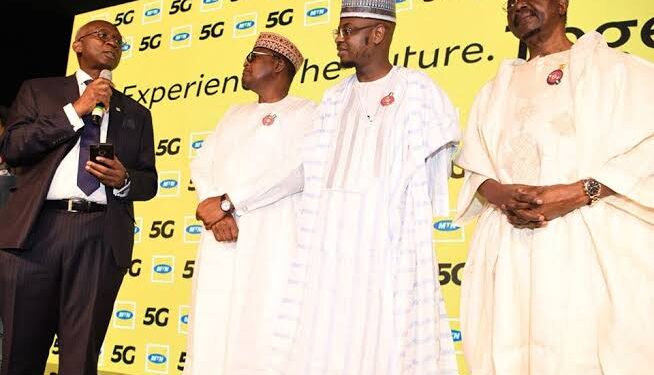The Nigeria Communication Commission (NCC) in partnership with MTN Nigeria has announced the rollout of 5G technology in Nigeria which is set to launch on the 24th of August, 2022. The announcement was made at the 90th Edition of the Telecom Consumer Parliament (TCP) held in Lagos on Thursday, the 22nd of June, 2022.
What is 5G Technology?
5G is the 5th generation mobile network. It is a new global wireless standard after 1G, 2G, 3G, and 4G networks. 5G enables a new kind of network that is designed to connect virtually everyone and everything together including machines, objects, and devices. The network technology uses higher radio frequencies that are less cluttered. This allows for it to carry more information at a much faster rate.
Why is this Important?
ICT is one of the fastest growing sectors which can propel Nigeria’s economy; with Lagos state as the hub of technology-driven startups in Africa. With this launch, there is bound to be a bigger and better advancement in every sector of the country’s economy— faster internet improves productivity which increases income and birth economic growth. While 5G offers to provide high internet connection speed, it is expected that different industries will be empowered, thus improving and strengthening the already thriving economy.
“Digital services and contents being provided by SMEs, especially fintech and e-commerce firms, will leverage broadband infrastructure and the upcoming deployment of Fifth Generation (5G) network being driven by the Commission to deliver more innovative and high-quality experiences to consumers,” Umar Danbatta, NCC’s Vice Chairman said.
Satellite and 5G Mobile Internet — What you need to know?
While 5G is the latest development of mobile internet, Starlink is the latest development in satellite internet and both services only recently received licenses to operate within Nigeria.
Starlink is a communication project under Elon Musk’s SpaceX, which combines the strength of over 2,400 mass-produced small satellites to provide internet connectivity to designated ground transceivers.
Launched in 2019, Starlink had been a popular choice in about 34 countries in the world except Nigeria; until May 2022, when Elon Musk announced that regulatory approvals had been granted to SpaceX by the Nigerian telecommunication regulators.
With the introduction of both advanced internet technologies into the Nigerian market, there is sure to be fierce competition and comparison between the two. However, both technologies have pros and cons, differences and similarities that can aid Nigerians in deciding which internet provider to choose from. In the following paragraphs, I compared and contrasted both technologies—5G and Starlink:
- Speed
A recent survey has shown that consumers who use 5G save nearly 23 hours per day while downloading data. Both technologies promise faster internet connectivity with 5G running at a maximum of about 50 megabytes per second (for now), making it faster than fiber but not quite as fast as Starlink which runs at a speed of 50-200 megabytes per second. Nonetheless, Starlink’s greatest strength isn’t speed but reach.
- Accessibility
Although Starlink was specifically tailored to meet the needs of rural inhabitants, both technologies are known to cost a lot more than their contemporaries, hence, a barrier that may limit access. Since 5G is built on already existing cellular infrastructure, where other generations could not reach over the years, 5G will be hindered as well. And though it provides higher frequency speed, it travels shorter distances than fiber or cable internet.
- Signal strength
The strength of Starlink’s internet connectivity is dependent on an open sky and clear weather as its signal beams down directly from space. Therefore, any and every obstruction caused by bad weather or heavy coverings can slow down and/or disrupt connectivity. Also, its bandwidth has been recorded to be finite, whereby too many users at a time and around the same space can reduce internet speed.
- Ecological disadvantage
While the Low Earth Orbit (LEO) satellites used by Starlink provide a wider range of strong internet connectivity, the alarming number of satellites it launches into space has been feared to bring more doom than shine.
NASA, has raised concerns about the possibility that these large constellations could increase the likelihood of collisions with both crewed and uncrewed assets in orbit.
Another concern raised by health practitioners is that the light pollution produced by the direct satellite rays beaming down on users are more likely to worsen with the project’s expansion, rather than decline. While 5G has also been surrounded by similar controversies revolving around health risks, there have been no findings or records of any health risk associated with the technology.
Furthermore, studies into the progress of the 5G network have shown that while the technology is indeed fast, it tends to drain system batteries faster than any other network. Users have turned up complaining over system overheating while running the network.
These and many more are some of the features of both the 5G and Starlink technologies. As we anticipate the arrival and full-on functioning and operations of these technologies in Nigeria, we can only hope that they both live up to expectations and lead Nigeria into a new age of faster and more reliable internet connection.

































